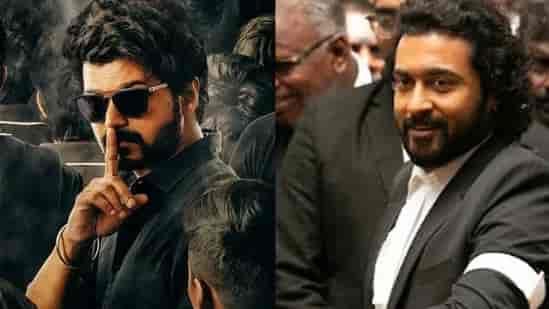From Karnan to Jai Bhim and Master: Best of Tamil cinema in 2021
- Here are eight Tamil releases of the year 2021 which are definitely a must watch for not just the fans of the Tamil cinema but for cinelovers from all walks of life.

- Haricharan Pudipeddi
Hindustan Times
Last Updated: 03.30 PM, Dec 29, 2021
As 2021 comes to a close, we take a look at Tamil films that made an impact, went beyond entertaining audiences and managed to appeal to a large section of the viewers without requiring the backing of a star. From Vijay’s Master to Dhanush’s Karnan and Suriya’s Jai Bhim, here are the best Tamil films of the year in no particular order.
Master
Lokesh Kanagaraj’s Master is one of Vijay’s most entertaining films in recent years. After proving his mettle with films such as Maanagaram and Kaithi, which worked even though they didn’t feature stars, Master is Lokesh’s maiden attempt at true-blue commercial cinema with one of the industry’s biggest stars, Vijay. He proves himself yet again, even if Master panders to Vijay’s fans more than the director's own. Master is a largely entertaining star vehicle, and one that’s devoid of the chest-thumping heroism Vijay’s films usually scream of.
Mandela
Debutant writer-director Madone Ashwin’s Mandela, which premiered directly on Netflix, is a political satire that’s both entertaining and extremely impactful, especially in the ways it addresses issues such as caste-based politics. The film makes one realize the importance of a single vote, and why it’s essential to understand modern-day politics in Tamil Nadu. One of the prime reasons why the film works effectively and mostly stays relevant is because of its comical treatment. Yet, it does strike an emotional chord without getting overly sentimental.
Karnan
Mari Selvaraj’s Karnan, which features Dhanush in one of his fiercest roles, is a bold, powerful portrayal of a flawed system letting down its people, caste-based riots and police brutality. Loosely based on the 1995 caste-riots in Kodiyankulam; Karnan paints an extremely hard-hitting story of a village fighting for its recognition. Karnan raises several valid questions – all equally important- about the state of the oppressed community in our society.
Maadathy
Leena Manimekalai’s Maadathy (streaming on Neestream) is a simple, straightforward film about the life of a carefree teenager who belongs to the ‘unseeable’ community in her village. But while Maadathy is the coming-of-age tale of the girl (and about her sexual awakening), it is also a hard-hitting commentary on caste and gender discrimination. Leena does not sugarcoat the way she portrays the horrors of caste pride. Leena doesn’t hesitate to ask all the uncomfortable questions. She questions how we build temples of goddesses but don’t treat the women in our lives with dignity.
Sarpatta Parambarai
Pa Ranjith’s Sarpatta Parambarai, unlike his recent movies, doesn’t openly discuss things like oppression and caste discrimination which had branded him as an anti-caste filmmaker. Breaking away from the image trap, Ranjith’s film is a straightforward, highly absorbing boxing drama about the clash between two popular clans - Sarpatta and Idiyappan - that ruled the North Madras in the 1970s. At the same time, it’s also an important story about one man’s fight for equality and glory. The film features Arya in a career-defining role.
Jai Bhim
TJ Gnanavel’s Jai Bhim will go down as one of the most important films in Suriya’s career. It’s one of those rare occasions where the star hasn’t flexed his heroism and let his co-stars steal the spotlight. Jai Bhim talks about the state of the oppressed, and even though the story takes place in 1995, the film points out how even today, nothing much has changed when it comes to the lives of the marginalised.
Maanaadu
Filmmaker Venkat Prabhu makes a very strong comeback with Maanaadu, which is a highly enjoyable, crowd-pleasing, and accessible time-loop thriller. It isn’t easy to take a concept like time-loop, and make it accessible for the masses. Venkat Prabhu cracks this formula successfully and that’s what saves Maanaadu from becoming just another novel attempt gone haywire. It is this formula that makes the film highly enjoyable, but at the same time uses the concept of time-loop in such a way that it never leaves the audiences wondering about what’s happening.
Writer
Debutant director Franklin Jacob’s Writer is one of the most important films of Tamil cinema, a polite answer to chest-thumping cop movies. Cut from the same cloth as Vetrimaaran’s Visaranai and Jai Bhim, Writer shines the spotlight on different aspects of the police department. Tamil cinema has always used police force as a medium to glorify its heroes without touching on their truly human side. Writer turns this trope on its head and gives us a protagonist who has been in police service for over 30 years but has never left the desk.

 Premium
Premium